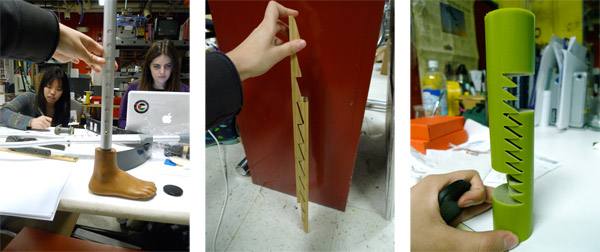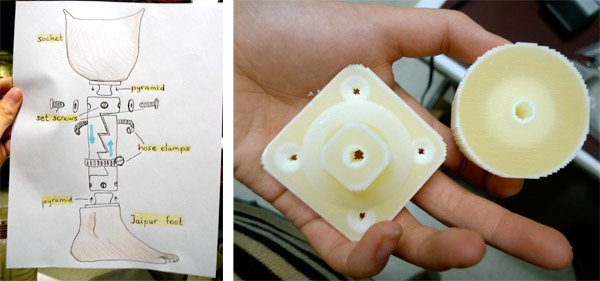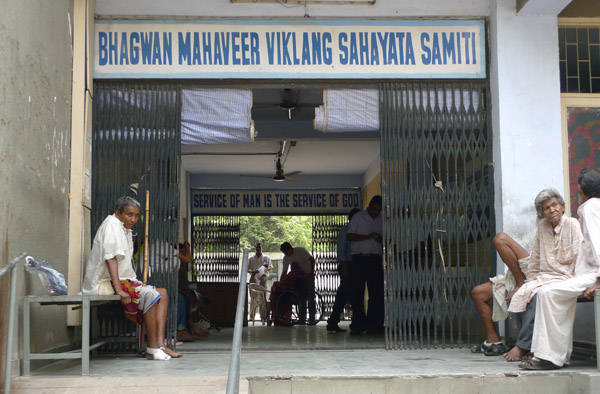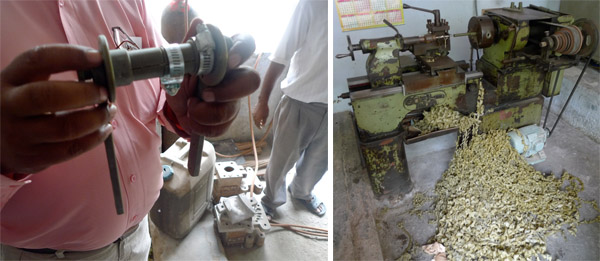Back in India
July 19th, 2010Tags: appropriate, bmvss, cindy oh, deema totah, delhi, design, developing world prosthetics, dhananjay gadre, fablab, human, jaipur foot, joel sadler, ken endo, limbs, pooja mukul, prosthetics, technology
To be able to invite dr. Pooja Mukul to Boston and travel to India to work with her, I am generously funded by the MISTI Global Seed Funds.
Last year, after setting up a FabLab at the COEP, I went to BMVSS, an organisation that provides low cost prosthetics to amputees in developing world countries. Since then, I’ve been slowly becoming more involved with working on medical devices. Last semester I was a teaching assistant in the class Developing World Prosthetics (taught by Ken Endo, PhD candidate in the Biomechatronics group), where I tried to share some of the FabLab processes to help with the design and prototyping of prosthetic limbs. I was the mentor for a team working on paediatric prosthetics in particular. The team consisted of Deema Totah and Cindy Oh, two awesome mechanical engineering undergrads.

Cindy and Deema on the right with a Jaipur foot, and then iterations on a theme made in the basement
Last time in Jaipur, dr. Pooja Mukul explained she was trying to make an extendable prosthetic for kids to use, but that she was running into too much difficulty getting a decent prototype together. We hope that at some point we can install a FabLab at BMVSS for this kind of R&D work, but meanwhile we played with the idea in our basement lab, with the intent of testing it in Jaipur at some point in the future.

Concept sketch and unbaked 3d printed pyramid connectors
In the DWP class, we had a bunch of cool guest speakers, including dr. Mukul, dr. Wu from Northwestern University, Bob Emerson, a prostheticist in Boston, and also Joel Sadler, who was on the team that developed the Stanford/Jaipur knee. Joel meanwhile graduated and started a company focussed on low cost prosthetic designs called (re)motion.

Hugh Herr and Joel Sadler
In India, I first visited the Delhi BMVSS clinic, where I was welcomed by Sanjeev Kumar and his crew. He’s been working with Ken Endo and others on another knee design, the Exo Knee. The Delhi Clinic is much smaller than the Jaipur clinic, but still sees 2-3 new patients a day and manufactures around 25 orthoses and 10 prosthetics a day.

Entrance to the Delhi Clinic
The Delhi clinic does not yet fit AK patients with the Stanford/Jaipur knee, although this may come in the future. Meanwhile they crank out a lot of these caliper knees, entirely hand lathed.

external caliper knee
The Delhi clinic deals with a lot of polio patients who are still looking for ways to be mobile. They manufacture orthosis using polypropylene sheeting moulded over nylon fabric, and fit the patients with those daily. The orthoses don’t have the rubber joints like they do in the US, they are hinged with rivets.

cutting the polypropylene to size
In Delhi, Dhananjay V. Gadre runs a mini FabLab working only on electronics projects. I visited his lab at NSIT, which was full of students even though it’s the middle of break for them. For prosthetics, Dhananjay has been working with Alex Schaub from the Amsterdam Fablab on making a low cost laser alignment system. Hopefully this can provide a spark for a medical devices and R&D FabLab in the future.
I’ll be here until August 5th, working on prosthetics and um, also finishing my thesis? Which (eek) is due far too soon.
